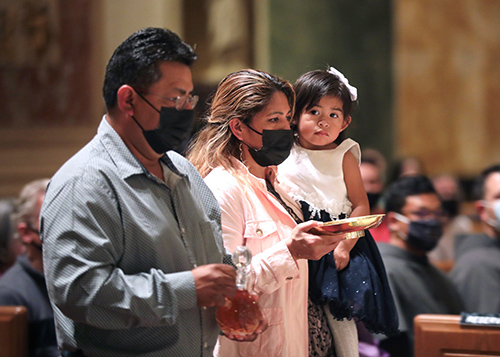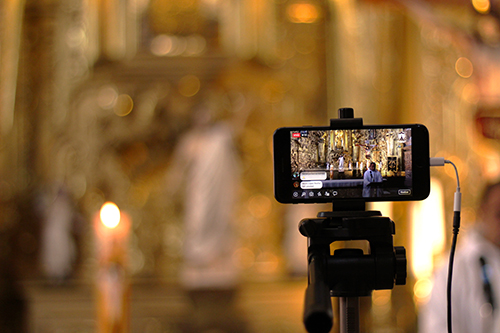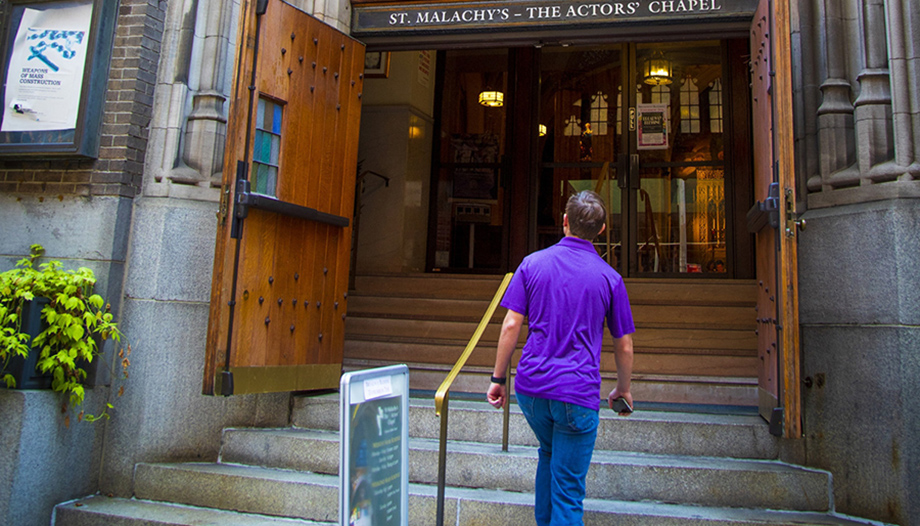"Every commitment to holiness, every action aimed at carrying out the Church's mission, every implementation of pastoral plans, must draw the necessary strength from the Eucharistic Mystery and must be ordered to it as its summit. This affirmation, which we find in the encyclical Ecclesia de Eucharistía, summarizes the centrality of the Eucharistic mystery in the life of the Church and, consequently, in the life of every Christian.
The Eucharist, and therefore the Holy Mass, are not "one more thing" or "something good" that we Christians do, for example, when we attend the Eucharistic sacrifice. We are Christians because God has saved us, and every Eucharistic celebration actualizes that mystery of salvation: life, passion, death and resurrection of Christ. "When we affirm that the Eucharist enlivens the Church, we are underlining that its lack would leave the Church itself without oxygen.
Without the Eucharist, indeed, we cannot live, for the simple reason that, without it, we could not live the Christian life. The Catechism points out this indissoluble unity unequivocally when he affirms that "if we Christians have celebrated the Eucharist from its origins, and in a form which, in its substance, has not changed through the great diversity of ages and liturgies, it is because we know that we are bound by the Lord's command, given on the eve of his passion: 'Do this in memory of me'".

Through the Eucharist we enter into the mystery of God through thanksgiving and praise to the Father, as a memorial of Christ's sacrifice and his Body and as the presence of Christ through the power of his Word and Spirit.
Without participation in the Holy Mass a Catholic is not complete. Charitable action, good works, etc., are born of this same principle of divine love of which the sacrifice of the cross, which is renewed in the Mass, constitutes its most sublime example.
Indeed, God is love, is charity. Charity is the nature of God and the Eucharist is the sacrament of charity: "The gift that Jesus Christ makes of himself, revealing to us the infinite love of God for every man". The Pope Francis’ in his catechesis of December 13, 2017 explained it in a similar way: "How can we practice the Gospel without drawing the necessary energy to do so, one Sunday after another, from the inexhaustible source of the Eucharist? We do not go to Mass to give something to God, but to receive from Him what we really need."
The whole Church -glorious, purgative and militant- is present and participates every time the Eucharistic sacrifice is celebrated, as described by a convert, Scott Hahn, in his book The Lamb's SupperThe sky is here. We have seen it without a veil. The communion of saints is all around us with the angels on Mount Sion, every time we go to Mass", a description that resembles the one we can find in the Catechism when it stresses that "the Church offers the Eucharistic Sacrifice in communion with the Blessed Virgin Mary and in memory of her, as well as of all the saints".
It's not just about go to to mass
For many of the faithful, attending Mass can be similar to entering a museum of modern art in which the keys to interpretation are unknown. Sometimes, in Christian formation, the insistence on the obligatory nature of going to Mass has weighed heavily, and not so much on the need for the spiritual nourishment that we receive every time we attend the sacrifice of the altar, especially through sacramental communion, which is what really gives life to our faith.
In the Mass we take an indispensable sustenance that, if lacking, would inexorably lead us to die of spiritual starvation. Just as our human condition "obliges" us to feed ourselves in order to continue living, so participation in the life of Christ needs to be nourished by communion. Nowhere more than in communion "we are what we eat," we participate in a real way in the divine nature that becomes flesh of our flesh: "Incorporation into Christ, which takes place through Baptism, is continually renewed and strengthened by participation in the Eucharistic Sacrifice, especially when it is made complete through sacramental communion. We can say that not only does each of us receive Christ, but Christ also receives each of us. He is close to us in friendship: 'You are my friends' (Jn 15:14). Moreover, we live because of him: 'He who eats me will live because of me' (Jn 6:57). In Eucharistic communion it is realized in a sublime way that Christ and the disciple 'are' one in the other (Ecclesia de Eucharistia, 22).
To go to Mass is to enter, physically and spiritually, into the history of salvation, uniting our personal history, circumstances, desires and projects to the life and heart of Christ. Participating in Mass requires this conviction, which, perhaps at times, we have forgotten to emphasize.
Making our whole day a Mass, as St. Josemaría Escrivá advised, will not be possible without active participation in the Eucharistic liturgy. In this sense, he points out Sacramentum CaritatisThis participation will not bear fruit if "one attends superficially, without first examining one's own life. This interior disposition is favored, for example, by recollection and silence, at least for a few moments before beginning the liturgy, fasting and, when necessary, sacramental confession. A heart reconciled with God enables true participation. In particular, the faithful must be persuaded that there cannot be a actuosa participatio in the Holy Mysteries if one does not at the same time take an active part in the life of the Church in its totality, which also includes the missionary commitment to bring the love of Christ to society".
Recognizing in the liturgy and in the mystery of the Holy Mass the history of Salvation is the key to appreciating and placing it at the center of every Christian's life.
All Catholics need a liturgical and Eucharistic formation through which to access, understand and apply all that is physically and sacramentally realized in the celebration of the Holy Mass.
At the dawn of the third millennium, St. John Paul II stressed the need to "recover the profound doctrinal motivations that are the basis of the ecclesial precept, so that all the faithful may see clearly the inalienable value of Sunday in the Christian life" (Dies Domini, 6).
The Eucharist makes the Church
To participate fully in the Mass in the Church presupposes doing so in body and soul. This is one of the main reasons why it can never be equated with participating in the celebration of the Eucharist in a "virtual" way, even if there are those who, because of their physical condition, cannot do so in any other way than in reality. In fact, the Church has foreseen that those who are unable to attend the community celebration of the Eucharist can receive sacramental communion in the places where they are, either because of illness or impediment. Because, in addition to the community that is present in the celebration of the Holy Mass-the people of God who gather together and make Christ present among them-effective participation in the Church is fully realized through sacramental communion. This is what St. John Paul II says in Ecclesia de Eucharistiawhen he points out the causal influence of the Eucharist in the very origins of the Church.
Being Catholic implies sacramental participation: "The faith of the Church is essentially Eucharistic faith and is nourished in a particular way at the table of the Eucharist. Faith and sacraments are two complementary aspects of ecclesial life. The faith which the proclamation of the Word of God arouses is nourished and grows in the graced encounter with the risen Lord which takes place in the sacraments" (Sacramentum Caritatis, 6).
"Eucharistic fasting" of the pandemic

Millions of believers have experienced an unprecedented situation in recent months: the impossibility of approaching, frequently or even for months, the sacraments and, in particular, the celebration of the Eucharist because of the coronavirus pandemic.
Catholics throughout the world have experienced, in their flesh and in their faith, the closing of churches and the prohibition of meetings. They have also experienced the human frailty, the sickness and, at the same time, the dedication of many priests, as well as the sadness of the death of many priests, men and women religious due to Covid19.
For their part, the priests experienced the unusual event of celebrating the Eucharist completely alone, in empty chapels and parishes with no other company, in many moments, than that of a mobile device through which millions of celebrations have been retransmitted.
The pandemic, we cannot forget, has been an occasion to sharpen the creativity of faith in many of our communities: technology has helped personal and community prayer and also to participate, in a limited way, in the celebrations of the Holy Mass.
There are many people for whom these moments have meant a journey of encounter with the Lord and the rediscovery of the value of the community of the faithful in which all of us, each following his or her specific vocation, develop and make up the Church.
Likewise, this time of imposed "Eucharistic fasting" has made it possible for many people to feel again that Eucharistic "awe" of which John Paul II speaks in Ecclesia de Eucharistia, and they have resumed with renewed enthusiasm the attendance at Mass even more frequently than that marked by the Sunday precept.
We return with joy to the Eucharist
After the most complicated phase of the Covid-19 pandemic and the lifting of the most severe restrictions, more than a few people have not returned to the celebration of Mass in person.
Many of them, it is true, are of advanced age, in many cases, dependent on a second person to take them to the church... others, perhaps, have stopped attending Mass in person for convenience or because of a mistaken conception that it is "worth the same" to hear or see the Mass in a virtual way than to be truly present.
Msgr. Robert BarronThe auxiliary bishop of Los Angeles masterfully described this attitude: "Many Catholics, during this period of COVID, have become accustomed to the ease of attending Mass virtually from the comfort of their homes and without the inconvenience of crowded parking lots, crying children and overcrowded pews. But a key feature of the Mass is precisely our coming together as a community." Alongside this, as the then Prefect of the Congregation for Divine Worship and the Discipline of the Sacraments, Cardinal Robert Sarah, emphasized in the letter he sent to the Presidents of Bishops' Conferences around the world under the title We Return with Joy to the Eucharist, "no transmission is comparable to personal participation or can substitute for it. Moreover, these transmissions alone run the risk of distancing us from a personal and intimate encounter with the incarnate God who has given himself to us not virtually, but really".
Returning to Mass, day after day, Sunday after Sunday, or perhaps after months or years without participating in the Eucharistic sacrifice, means, in the words of Pope Francis, "to enter into the victory of the Risen One, to be illuminated by his light, warmed by his warmth."
Go home, go back to mass
"To celebrate the Eucharist, therefore, it is necessary to recognize, first of all, our thirst for God: to feel in need of him, to desire his presence and his love, to be aware that we cannot go ahead alone, but that we need a Food and a Drink of eternal life to sustain us on the way. The drama of today we can say is that thirst has often disappeared. The questions about God have been extinguished, the desire for Him has vanished, the seekers of God are becoming scarcer and scarcer. It is the thirst for God that brings us to the altar. If we lack thirst, our celebrations become arid. Then, even as a Church, the small group of regulars who gather to celebrate the Eucharist cannot be enough; we must go into the city, meet the people, learn to recognize and awaken the thirst for God and the desire for the Gospel." These words of Pope Francis summarize the need to proclaim throughout the world the richness and necessity of the Eucharist in the life of every Christian, especially after the absence of public worship experienced in some of the months of the pandemic.
Beginning with Pope Francis, bishops, priests and leaders of the various communities have encouraged, and continue to encourage, the faithful to "return" in person to the reception of the sacraments, community formation and parish life.
When we look at the reactions of the faithful in various parts of the world, we see that those parishes that have been in contact with their people during the time of confinement maintain or even receive the attendance of the faithful to the sacraments. Through the retransmission of celebrations, virtual formation meetings, visits, sometimes from the street, to their neighbors and faithful or video calls... they have been creating a deep bond of community and have shown this community to neighbors who were previously unaware of its existence.
Obviously, the "homecoming" is also a challenge for priests and parishes. Nations such as the three English-speaking countries of East Africa: Kenya, Uganda and Tanzania, have experienced very different situations, ranging from the continuity of worship in Tanzania even at the height of the pandemic, or the total closure of the temples in Uganda, which, despite their reopening last fall, are now closed again due to the increase in cases. In the case of Kenya, after a period of closure, the temples have reopened and the faithful have slowly resumed sacramental life in an almost normalized way.
In this regard, priests from Peru, Guatemala, Ecuador and Mexico agree that, although there is still fear of contagion of the coronavirus, many people have been happy with the reopening of the temples and have renewed and even increased Eucharistic devotions such as Adoration of the Blessed Sacrament.
"Come home, we have missed you", with this suggestive invitation, the Archdiocese of New York, with its Archbishop at the head, has been encouraging, since the beginning of last summer, to return to the temples, especially to the Holy Mass. Under the hashtag #BackToMassNY testimonies and reasons to return to sacramental practice, confessional guides, health recommendations and training programs are offered.
As the parish priest of Saint Jean Baptiste de Grenelle in Paris pointed out, the Church had already experienced a first disfinement at Pentecost, when, after the coming of the Holy Spirit, the disciples, until then confined to their homes out of fear, began to proclaim God.
Today and always we are all called to live this grace of the coming of the Holy Spirit in our lives and to do so in our communities, united by the charity and fraternity born of the Eucharist. n











